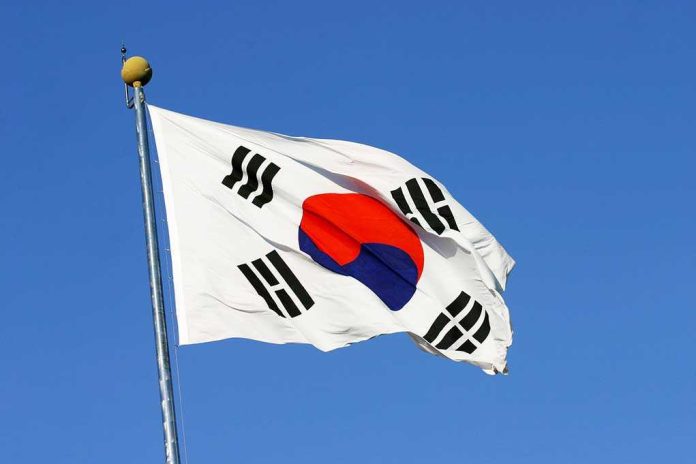
South Korea’s former conservative president and his wife are now both behind bars, exposing a political and legal earthquake that threatens to reshape faith in leadership and the rule of law in Asia’s fourth-largest democracy.
Story Snapshot
- Both former President Yoon Suk Yeol and his wife Kim Keon Hee are jailed, a first in South Korean history.
- Kim faces charges of bribery, stock manipulation, and political interference; Yoon was previously impeached and imprisoned for abuse of power.
- The arrests follow a failed martial law attempt and signal deep political upheaval amid a liberal government crackdown on past corruption.
- Experts warn the unprecedented legal action could deter future abuses but risks deepening political polarization and cynicism.
Simultaneous Jailing Shocks South Korea’s Political System
The arrest of former first lady Kim Keon Hee on August 13, 2025, marks the first time in South Korean history that both a former president and his wife have been simultaneously detained. Her charges of bribery, stock manipulation, and meddling in political party candidate selection come just months after her husband, Yoon Suk Yeol, was removed from office and jailed for attempting to impose martial law during a fierce political standoff. This double jailing is unprecedented and signals a major escalation in South Korea’s long-running struggle with political corruption and the question of accountability at the highest levels of government.
Yoon’s downfall began in December 2024, when he sought to declare martial law to maintain power amid legislative gridlock. Lawmakers quickly impeached him, and by April 2025, the Constitutional Court had formally removed him from office. After a brief release from prison in March, Yoon was rearrested, reinforcing the image of a disgraced leader unable to escape legal repercussions. Kim Keon Hee’s arrest followed a special prosecutor’s request, which cited the risk of evidence destruction, and she now awaits further questioning in detention. Both deny all wrongdoing, but the legal process is ongoing and is expected to produce additional indictments and revelations.
Political Context: Liberal Crackdown and Conservative Fallout
Kim’s arrest is not an isolated event but part of sweeping investigations launched by Seoul’s new liberal government after taking power. Special prosecutors with expanded authority are probing the Yoon administration, seeking to distance the current government from the previous regime’s scandals. The People Power Party, Yoon’s political base, now faces an existential crisis, with leadership fractures and plummeting public support. These events play out against a backdrop of South Korea’s history of post-presidential prosecutions — though never before has both a president and first lady been incarcerated at the same time. The situation has amplified debates about political vendettas versus the genuine pursuit of justice, with many conservatives in South Korea and abroad viewing the crackdown with suspicion.
The charges against Kim include allegations of accepting luxury gifts from the Unification Church, manipulating stock prices, and exerting improper influence over party candidate selection. The scope and gravity of these accusations have fueled public outrage toward political elites, but some commentators caution that such aggressive legal action, if perceived as partisan, could worsen polarization and undermine faith in the justice system. Kim has publicly apologized for “causing concern” but maintains her innocence, characterizing herself as “a nobody.” The special prosecutor’s office has not yet released detailed evidence, further stoking speculation and mistrust among the public.
Broader Implications: Rule of Law, Reform, and Rising Cynicism
The immediate impact of these events is severe political fallout for South Korea’s conservative opposition, as the People Power Party contends with reputational damage and potential internal division. Experts suggest the case could set new precedents for transparency and accountability in a country long troubled by corruption scandals. However, the aggressive use of legal tools against former leaders also raises questions about political motivations and the potential for overreach under the new administration. The broader public, meanwhile, is faced with renewed cynicism about the integrity of political elites, but also with a strengthened call for deeper reforms to restore trust in government institutions.
Economically, the instability may undermine investor confidence and threaten policy continuity, while the financial sector and religious organizations — especially the Unification Church — come under increased scrutiny. Legal scholars highlight the unprecedented nature of this dual prosecution, warning that while it may deter future abuses of power, it could also deepen societal divisions if not balanced with transparency and fairness. The international community is watching closely, as the outcome will likely influence both South Korea’s political culture and its global standing as a democracy committed to the rule of law.
Wife of South Korea's Jailed Ex-President Yoon Arrested over Corruption Allegations https://t.co/CNyz2EljNO
— Military.com (@Militarydotcom) August 13, 2025
Legal consensus and media reporting agree on the core facts: the timeline, the charges, and the ongoing investigations are well-validated by court records and official statements. While Kim and Yoon await further proceedings, the nation must grapple with the implications of holding powerful figures accountable — and the risks of political retaliation masquerading as justice. For Americans, especially those attentive to the erosion of constitutional protections and government overreach, the Korean case serves as a sobering reminder of the need for vigilance against unchecked power, whatever the political party in charge.
Sources:
Wife of South Korea’s jailed ex-President Yoon arrested over corruption allegations
South Korea arrests wife of impeached former president Yoon
South Korea arrests wife of impeached former president Yoon



